Diplomatic Bluebook 2025
Chapter 4
Japan's Diplomacy Open to the Public
2 Japanese Continuing Working in the International Community
(1) Japanese Continuing Working in International Organizations
International organizations are founded to serve the common interest of the international community. People of various nationalities join these international organizations, and draw on their skills and traits to create an environment where people of the world can live in peace and enjoy prosperity. Many international organizations are working to address global issues that no one country can solve alone, including Russia's aggression against Ukraine, the Israeli-Palestinian situation and the resulting food and humanitarian crisis, as well as the environment, climate change, refugees, infectious disease control, sustainable development, disarmament and non-proliferation, conflict prevention and peacebuilding, energy, disaster management, labor, human rights and humanity, gender equality, etc.
Talented individuals with specialized knowledge, passion and capabilities to contribute to the world's interests are needed so that international organizations can competently perform their duties and fulfill the roles expected of them. Japan makes policy contributions as a member country of these international organizations, and makes assessed and voluntary contributions. In addition to these efforts, the activities of Japanese staff are also an important part of Japan's contributions. Additionally, a larger number of talented Japanese people continuing to work in international organizations will further enhance Japan's presence in the international community more visibly. Japanese staff are involved in various fields and duties at different locations, but they share the same goal of solving various issues facing the international community. Moreover, encouraging the employment of more Japanese nationals who can continue working on the international stage with professional experience at international organizations will in turn lead to enrichment of Japan's human resources, contributing to the development of Japan as a whole.
Currently, Japanese nationals are serving in important posts at international organizations that include the United Nations (UN). Japanese nationals are actively performing leadership roles at organizations such as the Universal Postal Union (UPU), a specialized agency of the UN that Mr. METOKI Masahiko assumed leadership of in January 2022, and the Asian Development Bank (ADB). In addition, for many years Japan has sent a succession of Japanese judges to international courts such as the International Court of Justice (ICJ), the International Tribunal for the Law of the Sea (ITLOS), and the International Criminal Court (ICC). In light of the importance of international organizations for addressing global challenges, securing the top and other important posts that contribute to strengthening ties between Japan and international organizations is an important challenge. On the other hand, the top and other important posts of international organizations are not something that can be secured overnight. It is necessary to make a finely tuned response by adopting a long-term perspective while cultivating suitable personnel.
With the aim of increasing Japanese personnel, the Government of Japan has set a target of 1,000 Japanese nationals working for UN-related agencies by 2025. To this end, in collaboration with universities, related ministries and agencies, and organizations, MOFA is actively recruiting, training and supporting Japanese nationals who can continue working in international organizations and make a contribution on the global stage. Currently, 958 Japanese nationals (as of the end of 2023; figures gathered by MOFA) are working as professional-level or higher-level staff in UN-related agencies around the world. In order to increase the number of Japanese personnel, MOFA runs the Junior Professional Officer (JPO) Programme (See the Column on page 332.), which sends young Japanese nationals who wish to work for international organizations to positions in international organizations for a term of two years, with the aim of gaining regular staff positions in such organizations after the term. MOFA also runs a program to support the advancement of Japanese nationals who can be future managerial candidates by offering them mid-career level professional experience. In addition to encouraging the employment of more Japanese nationals through these initiatives, MOFA is working to coordinate with international organizations and gather information for the recruitment and promotion of Japanese staff.
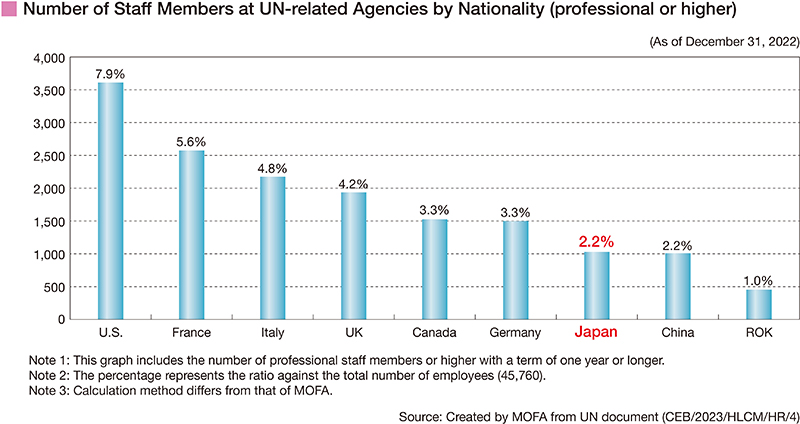
For Japanese nationals who wish to work for international organizations, the MOFA Recruitment Center for International Organizations continually provides useful information of vacancy announcements at international organizations on its official website and through mailing lists, social media such as Facebook, X (formerly Twitter), LinkedIn, and Instagram, as well as video sharing platforms such as YouTube. The Center also focuses on providing assistance regarding application. In addition, the Center works on publicity through holding seminars explaining the attractiveness of working at international organizations and methods to apply for a job, and also online and in-person explanatory sessions with invited senior Japanese staff working for international organizations and human resource specialists from international organizations.
MOFA will continue to encourage the recruitment of more Japanese nationals working in international organizations and support their promotion, so that a larger number of competent Japanese nationals who have high aspirations and passion to contribute to solving global issues can take part in international organizations.
In the Junior Professional Officer (JPO) Programme, international organizations such as the United Nations (UN) accept young personnel funded by their respective national governments. The Ministry of Foreign Affairs (MOFA) began dispatching Japanese nationals under this scheme in 1974, with 2024 marking the 50th anniversary of MOFA's engagement. A total of more than 2,000 people have participated to date, and around half of the Japanese nationals currently active at international organizations are former JPOs. They are active around the world as the “face of Japan,” addressing cross-border issues. This column introduces the experiences of former JPOs currently active at the UN as the “face of Japan.” Through programs such as the JPO Programme, MOFA will continue to support as many Japanese nationals as possible to play an active role at international organizations.
■Voice of a Former JPO
My Calling: From a R&D Professional for a Domestic Venture Firm to a UN Administrative Officer
TANIMOTO Akiko, Administrative Officer, Department of Management Strategy, Policy and Compliance (DMSPC), UN Secretariat
After working in Human Resources (HR) software research and development for a venture firm in Japan, I looked to change specializations, enrolling in graduate school. As part of the curriculum, I visited the Japan International Cooperation Agency (JICA) Myanmar office, and realized for the first time there are fields overseas where I could make the most of my skills and experiences. This marked a turning point for me. While visiting UN organizations, I happened to meet and introduce myself to an HR Officer, who said “we would like to have you here, even as an intern.” Based on this frank offer, I decided to aim for HR work at the UN. After interning at a capability development project at the JICA Timor-Leste Office, and experiences in the HR departments of the UN Educational, Scientific and Cultural Organization (UNESCO) headquarters in Paris and the UN University (UNU), I applied to be a JPO. I was dispatched to serve as an administrative officer in charge of HR at the Department of Management Strategy, Policy and Compliance (DMSPC) at the UN Secretariat headquarters (New York).
As the name suggests, DMSPC is a department that aims to ensure compliance with the UN's management strategies and policies. I am involved with the overall HR field management in the Executive Division of the Under-Secretary-General's Office. All of the work I am involved with, including recruitment, is very delicate, a lot of it is very tricky, and the workload was overwhelming to begin with. However, I was blessed with supportive supervisors and colleagues, and I have come to feel that I am suited to this work, which is very motivating. I was appointed as a permanent officer from September 2024, and I enjoy the challenges I work on every day.
 The view commuting from the ferry. This angle shows the UN Headquarters buildings clearly.
The view commuting from the ferry. This angle shows the UN Headquarters buildings clearly.In the beginning I had never thought about working at the UN and had never studied abroad. In that sense, I feel I was as far from the UN as possible. Because of that, I was often confused by differences in organizational culture while also struggling with my lack of international experience and intuition, which was mentally draining. While I was at the UNESCO HR department, a colleague said to me that “your career is something that just happens.” Often you don't realize what sort of work or environment you are suited for, and you don't always have the chance to do the work you want at the timing you hope for. Despite that, looking back I feel that by valuing the opportunities that come each day and helping myself grow, I likely came across the work which I believe is my calling. I hope to keep contributing to the development of the HR field in order to create a society in which everyone around the world – including, of course, at the UN – can work with motivation and fulfillment every day.
■From JPO to the Center of the UN Stage
Between a Rock and a Hard Place – Ideal and Reality
ITO Ayaki, Director of UNHCR's Division of Emergency, Security and Supply, Office of the UN High Commissioner for Refugees (UNHCR)1
In 1993, I was dispatched as a JPO to the UNHCR field office in Maungdaw, a small town located on the border of Myanmar and Bangladesh. It took two days to reach Maungdaw from Yangon, Myanmar's former capital, by plane, boat, and four-wheel drive vehicle, and it was the first time that UNHCR international staff had been stationed there. It was an important period of time then, as Rohingya refugees2 who had fled to Bangladesh had begun returning to Myanmar. I used off-road motorcycles and boats to visit villages, checking on the situation of the returnees and spending extended periods negotiating with the local authorities to address issues. In the beginning, I wasn't fully confident with the assignment in field operation, but I was very fortunate to have inspiring supervisors and colleagues, and the experiences I had during those two years built the foundation for my career to come.
30 years later, I have been transferred 14 times to 10 different countries. Today, there are around 123 million people3 worldwide who have been forced to flee their homes, including refugees and internally displaced persons. Another approximately 4.4 million people live as stateless persons with no nationality. The mandate of UNHCR is to protect and support them through its network of more than 500 field offices across around 135 countries.3 Based on the principle of the “field-based approach” advocated by former High Commissioner of UNHCR, OGATA Sadako, over 90%3 of our officials are active in the field, working through direct engagement with the affected people. International staff operate under a rotation system, in which they are required to transfer every two to five years. Around 90 Japanese staff members3 are active in this system, over 70%3 of whom are women. Many of them came through the JPO Programme to become UNHCR staff.
Many refugees and internally displaced persons have been forced to flee their homes due to persecution, human rights violations, and conflicts. Their numbers have been increasing for 13 consecutive years since 2011.3 Fundamental political settlements in their home countries are essential for them to return in safety, but as turmoil in the international community worsens, achieving them is no simple task. While supporting countries receiving refugees, UNHCR also focuses on improving the situation in their home countries. While serving as UNHCR Representative in Syria and Lebanon, I was engaged in creating an environment for voluntary repatriation in safety for Syrian refugees through relief items and legal support. At the same time, as prejudice and hostility toward refugees were growing in Lebanon, we also listened to the concerns of people in the host country, striving to protect the rights of refugees while maintaining a balance. Moreover, in today's world where we face unpredictable issues such as the COVID-19 pandemic, the ability to handle complex situations in which there may not always be a universal “correct answer” is required. In other words, I believe that UNHCR staff need the ability to implement effective refugee support and protection between reality and ideals.
To that end, UNHCR staff must listen seriously to what refugees say, identify the essence of the issues, understand the perspectives of diverse stakeholders, quickly make decisions, and take action on the front line. This remains a core principle that guides my work to this day.
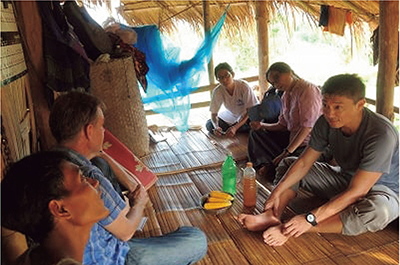 The author (right) hearing from refugees who returned to their villages deep in the mountains of Kayah State, Myanmar, on the Thailand border (2013 ©UNHCR/Jane Gabriel Holloway)
The author (right) hearing from refugees who returned to their villages deep in the mountains of Kayah State, Myanmar, on the Thailand border (2013 ©UNHCR/Jane Gabriel Holloway) The author (right) working in a camp for internally displaced persons in Mogadishu, capital of Somalia (2012)
The author (right) working in a camp for internally displaced persons in Mogadishu, capital of Somalia (2012)I truly hope that more and more Japanese nationals will take their first step on the international stage through the JPO Programme and contribute to global peace and humanitarian efforts.
- 1 The official title is as of January 2025
- 2 Refugees from Rakhine State, Myanmar
- 3 The official figures are as of January 2025
(2) Activities of Non-Governmental Organizations (NGOs)
A Development Cooperation
As leaders in undertaking Japan's “visible development cooperation,” Japanese NGOs ascertain in detail what is needed on the front lines of development as well as provide rapid and flexible support in accordance with each circumstance. They are therefore strategic partners in implementing Official Development Assistance (ODA).
Through NGOs, MOFA actively provides ODA via financial cooperation in the form of grant assistance (Grant Assistance for Japanese NGO Projects) for economic and social development projects implemented by Japanese NGOs in developing countries and regions. The projects cover a wide range of assistance, including health, medical and hygienic care (e.g., maternal-child health, tuberculosis measures, water and sanitation), rural development (e.g., improvement of agricultural environments and livelihoods), support for people with disabilities (e.g., vocational training and employment support), education (e.g., basic education, inclusive education, school construction), disaster risk reduction, and countermeasures for landmines and unexploded ordnances (UXO). In FY2023, MOFA provided funding for 109 projects to Japanese NGOs (62 organizations) implementing Grant Assistance for Japanese NGO Projects in 39 countries and 1 region in Asia, Africa, the Middle East, and Latin America and the Caribbean. Moreover, the NGO Project Subsidies are provided to improve the project execution capabilities and expertise of NGOs and to support activities that contribute to the promotion of NGO projects.
In addition, the Japan Platform (JPF) ─ which was established in 2000 through cooperation and partnership between the government, NGOs, and business communities to provide more effective and rapid emergency humanitarian assistance in the event of large-scale natural disasters and conflicts ─ has 47 NGO members as of December 2024. In 2024, JPF launched programs such as providing assistance to victims of the Southeast Asia floods and the floods in eastern Bangladesh. In addition, JPF provided support to refugees and internally displaced persons in Ukraine and neighboring countries; Myanmar, Bangladesh, South Sudan and neighboring countries; and Ethiopia, Yemen, Pakistan, Mozambique, Afghanistan, Iraq/Syria and neighboring countries.
MOFA provides support for NGO activities through various policy measures aimed at enhancing their capability and expertise as well as developing human resources so that NGOs can strengthen the foundation for their activities and perform further tasks. In 2024, MOFA implemented four programs to improve the environment for NGO activities: the “NGO Consultant Scheme” (See the Special Feature on page 336.), “NGO Study Program,” “NGO Intern Program,” and “NGO Study Group.”
The FY2023 plenary meeting of the NGO-MOFA Regular Consultation Meeting, the purpose of which is to promote dialogue and coordination between NGOs and MOFA, was held in August 2023. As the two sub-committees, Meetings of the Partnership Promotion Committee were held in July and December the same year and March 2024, while ODA Policy Council meetings were held in July and December 2023 and March 2024, all of which saw lively exchanges of views.
B Partnership in Other Major Diplomatic Areas
The Government of Japan holds dialogues with civil society including NGO representatives and experts on matters related to government reports to be submitted based on various human rights treaties, as well as on the National Action Plan on Business and Human Rights, and the National Action Plan on Women, Peace and Security, which is based on UN Security Council (UNSC) resolution 1325 and related resolutions.
In the area of conventional weapons, MOFA works in cooperation with NGOs in implementing clearance of mines and UXOs, and mine risk education projects, in countries affected by mines and UXOs.
Furthermore, in the area of nuclear disarmament, MOFA has been conducting dialogues with various NGOs and experts. Through the commissioned projects known as the “Special Communicator for a World without Nuclear Weapons” and the “Youth Communicator for a World without Nuclear Weapons,” the Government supports the activities, including that of NGOs, for atomic bomb survivors and others to convey the realities of the atomic bombings to the international community,
As of December 2024, a total of 320 Special Communicators on 108 occasions and a total of 787 Youth Communicators on 55 occasions have been dispatched to the world through these commission programs.
Concerning the countermeasures against transnational organized crime, in order to promote public-private cooperation especially on trafficking in persons, the Government exchanges opinions with NGOs regarding recent trends of trafficking in persons and effective measures to appropriately address this crime.
(3) Japan Overseas Cooperation Volunteers, Experts and Others
The Japan Overseas Cooperation Volunteers (JOCV, JICA Volunteer Program) is a Japan International Cooperation Agency (JICA) program that aims to have Japanese citizens aged 20 to 69 with skills, knowledge, and experience cooperate for, and contribute to economic and social development in developing countries through living, working and fostering mutual understanding with local residents. As of the end of March 2024, a total of 56,402 JOCVs have been dispatched to 99 countries since the program's launch in 1965. The dispatched volunteers have been engaged in approximately 18 job categories in nine sectors: Planning/Government, Business/Tourism, Public Works/Utilities, Human Resources, Agriculture/Forestry/Fishery, Health/Medical Care, Mining and Manufacturing, Social Welfare Services, and Energy. Efforts are also being made to give the knowledge and experience of returned JICA volunteers to Japanese society in educational settings, local communities, and private companies and elsewhere. The activities of JOCVs, which are founded on the participation of Japanese citizens, are highly regarded both domestically and internationally, particularly in host countries. (See the Column on page 337.)
JICA experts with specialized knowledge, skills, and experience are dispatched to governmental agencies and sites of development cooperation in developing countries. The experts, providing high-level policy recommendations and transferring necessary skills and knowledge to government officials and engineers of the partner countries, work together with their counterparts to develop, promote and disseminate technologies and systems that are suitable to each country's context. These experts, who actively engage in a wide range of sectors, including those addressing basic human needs such as health/medical care and water/sanitation, and those of socio-economic development such as legal system development and formulation of urban planning, contribute to the economic and social development of developing countries and the fostering of mutual trust between Japan and these countries. A total of 7,702 experts were newly dispatched in FY2023, with the scope of activities reaching 99 countries and regions.
Japanese international cooperation NGOs are demonstrating a significant presence by providing fine-tuned support tailored to local residents, leveraging the experts and experience of civil society in developing countries and regions. The NGO Consultant Scheme, to which the Ministry of Foreign Affairs (MOFA) has provided ongoing support, plays a major role in the growth of these NGOs. The Scheme began in 1999 as part of a program to develop the environment for NGO activity, and marked its 25th anniversary in 2024.
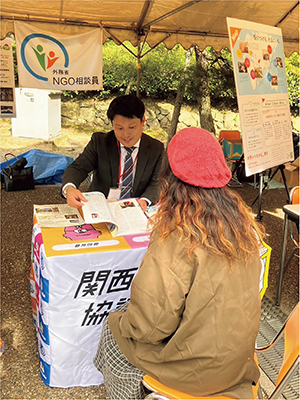 Responding to inquiries at a booth during visiting service (Photo: Kansai NGO Council)
Responding to inquiries at a booth during visiting service (Photo: Kansai NGO Council)NGO Consultants aim to increase the public understanding of international cooperation, raise the baseline operational capabilities and strengthen the foundations of regional NGOs, and work on further enhancing the information provision of specific organizations under contract from MOFA. Currently, a total of 10 organizations across nine blocks (Hokkaido, Tohoku, Kanto, Chubu/Hokuriku, Kinki, Chugoku, Shikoku, Kyushu, and Okinawa) are active as NGO Consultants, reaching prefectures around Japan by also providing a visiting service. Their main areas of activity are responding to inquiries and requests for advice from the general public about the field of international cooperation (such as the establishment and organizational operation of NGOs, support in finding employment in NGOs and international cooperation-related organizations, and providing information about international cooperation activities), supporting NGO publicity activities, and the visiting service. The visiting service involves, for example, opening NGO Consultant booths such as at international cooperation-related events held around Japan, responding to requests for advice from event participants. Visiting Consultants also hold lectures, seminars, and workshops related to international cooperation based on requests from JICA, local governments, civil society groups, and schools. In such ways, Consultants contribute to promoting understanding of international cooperation as well as NGO growth in Japan.
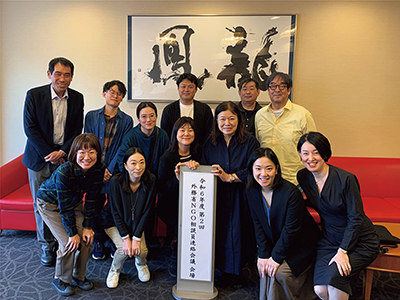 Commemorative photo at the Second NGO Consultants Liaison Meeting of FY 2024 (Kochi Prefecture)
Commemorative photo at the Second NGO Consultants Liaison Meeting of FY 2024 (Kochi Prefecture)In addition, NGO Consultants Liaison Meeting is held twice a year between MOFA's Non-Governmental Organizations Cooperation Division and NGO Consultants, which include exchanges of opinions and information sharing about the Scheme's operational direction and issues which should be addressed in entirety. In such ways, MOFA is working to further enhance the NGO Consultant Scheme. The Second Meeting of FY2024 was held in Kochi City together with the “International Festival 2024” international cooperation event. Speakers from the NPO SEASIDE GALLERY and Kochi University Center for Regional Sustainability and Innovation were also invited to this Meeting to share their experiences on the topic of “how to broaden the base scope of regional internationalization and international cooperation?” After the speeches about initiatives promoting the internationalization of Kochi Prefecture while aiming for coexistence with local communities, the issues and future outlooks in the respective regions were discussed through lively Q&A sessions as well as group debates. Exchanges of opinions were also held about the number of requests for advice, distinctive initiatives, visiting service implementation status, future challenges, etc. at each organization.
Looking ahead, MOFA will work through the NGO Consultant Scheme for the growth of Japanese international cooperation NGOs as well as further promoting understanding of international cooperation and NGO activities among the public.
Walking through town, I hear cheerful greetings like “morning!” and “ohayō!” I am in the Solomon Islands, a small archipelago in the Pacific Ocean to the northeast of Australia. The country has deep historical connections with Japan, including sites of fierce battles during the Pacific War such as Guadalcanal. What I was most surprised about after arriving in the Solomon Islands was how people on the street would speak to me in Japanese, saying ohayō (good morning) and arigatō (thanks). When I asked the locals why, they told me “A JICA Volunteer had once been based in our village...” and then talked about their memories of the JICA Volunteer. They also conveyed their thanks, saying “We are grateful for them coming to help the Solomon Islands. We love the Japanese people.” Above all, they appreciate the national character of the Japanese people, such as diligence, politeness, and kindness. I believe this was the result of the actions of each Japanese participant in the JICA Volunteer program and other projects over the years.
I am based at a small elementary school with a total of around 150 students run by the Guadalcanal Province, on the island of Guadalcanal, where the capital is. The Solomon Islands faces a variety of issues in education. One is that the rate of school attendance is low, partly because there is no compulsory education, and another is the disparities in attitude toward education between teachers and parents. Progress has been made in creating and distributing the educational curriculum and textbooks over the last ten years thanks to support from overseas. Going forward, thoughtful lesson planning as well as improvements to the teaching skills of fellow teachers are needed so that children can enjoy their learning.
As part of my activities, I have advocated for the theme of “creating a school” where children can feel that “school is a fun place.” To that end, I believe that close cooperation between teachers, students, and parents is essential, and have drawn up specific plans to engage with each of them.
I hold a training day for teachers once a week. During the training, they work to enhance their teaching skills through discussions that I lead about skill building and how to engage with their work as teachers. We provide children with opportunities for learning through experiences outside the classroom, such as field trips, events once per term, and tending a school vegetable garden. To encourage parents to take a greater interest in school and their children's education, I have suggested open class days and parent-teacher conferences. By having parents see what children experience at school, I am working to foster a shared awareness of working in cooperation to raise children.
 Group photo taken with fellow teachers at St. Mary Tanagai School on World Teachers' Day (the author is in the center with the lei around her neck)
Group photo taken with fellow teachers at St. Mary Tanagai School on World Teachers' Day (the author is in the center with the lei around her neck)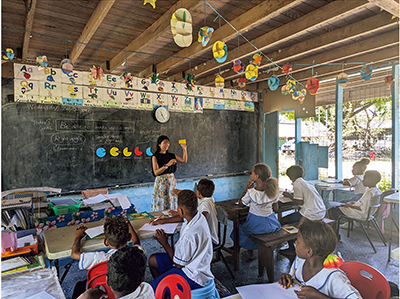 The author teaching mathematics to third graders
The author teaching mathematics to third gradersBeing based in an unfamiliar country, I have had struggles with interpersonal relationships and learning the language, but I have been able to continue my activities thanks to the people of the Solomon Islands, who have always been there for me and treated me like family. The COVID-19 pandemic not only delayed my dispatch but also changed the country I was previously assigned to, and it began four years later than originally planned. Nevertheless, I am grateful from the bottom of my heart that I was able to volunteer here. My two-year assignment is almost finished, but I will do everything I can right until the end, doing my best for the people of the Solomon Islands.
To date, many young Japanese people have participated in the Japan International Cooperation Agency (JICA) Japan Overseas Cooperation Volunteers (JOCVs) program, which forms a bridge connecting Japan and the people of developing countries. Among all countries worldwide, Malawi has received the highest number of volunteers. Volunteer dispatches to Malawi began in 1971, and in 2021, the program marked its 50th anniversary there. Over 1,900 volunteers have been dispatched in total, supporting various fields such as health and medicine, education, and agricultural development.
In Malawi, it is common to hear that people in every region have worked with Japanese volunteers. Government officials also recall having been taught by former volunteer teachers. A common theme in these accounts is praise for JOCVs who, despite harsh conditions, lived the same lifestyle as the Malawian people and worked hard alongside them from the same perspective.
 A volunteer giving lessons at a school (March, Nsaru, Malawi; Photo: JICA)
A volunteer giving lessons at a school (March, Nsaru, Malawi; Photo: JICA)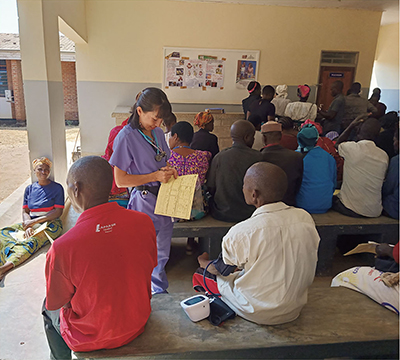 A volunteer conducting on-site medical consultations (July, Salima, Malawi; Photo: JICA)
A volunteer conducting on-site medical consultations (July, Salima, Malawi; Photo: JICA)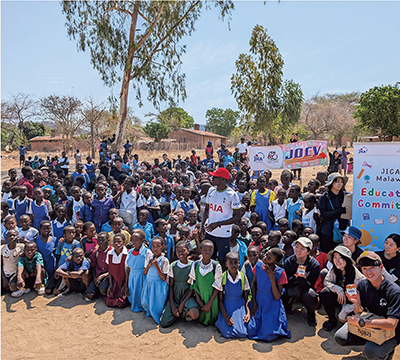 Group photo at a sports day mainly organized by volunteers (October, Monkey Bay, Malawi; Photo: JICA)
Group photo at a sports day mainly organized by volunteers (October, Monkey Bay, Malawi; Photo: JICA)Even after leaving Malawi, the bonds created by the volunteers continue. In 2019, Malawi's former Minister of Foreign Affairs and International Cooperation, Francis Kasaila, visited Japan for the Seventh Tokyo International Conference on African Development (TICAD 7) held in Yokohama. During his visit, he reunited after 36 years with his two former volunteer teachers of mathematics and science who had been dispatched to his hometown of Nsanje. At the 2020 Tokyo Olympic and Paralympic Games, Ota City in Gunma Prefecture served as a host town for Malawi, with strong support from a former volunteer. Since then, Ota City has continued exchanges, welcoming English teachers from Malawi and sending relief supplies there. In August 2024, Minister of Foreign Affairs Nancy Tembo visited Japan and met with Mayor of Ota City SHIMIZU Masayoshi to discuss advancing plans for a friendship city agreement.
Although the COVID-19 pandemic caused difficult times, including the evacuation of JOCVs abroad, as of November 2024, 47 volunteers remain active across Malawi. Upon completion of their service, each volunteer is given a Certificate of Recognition from the Minister of Foreign Affairs through the Japanese Ambassador to Malawi. This tradition began in 2009, the year after the Embassy opened in Malawi. Many former volunteers continue to work for the benefit of Malawi and Africa as a whole. The steady efforts of individual JOCVs have been a catalyst for Japanese nationals to understand Malawi and Malawians to understand Japan. Through these activities, JOCVs play a major role in deepening the friendly relations between Japan and Malawi and are a significant asset for Japanese diplomacy.




